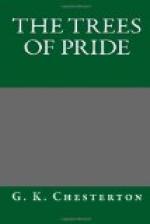Whether this apparition was a tramp or a trespasser, or a friend of some of the fishers or woodcutters, Barbara Vane was quite unable to guess. He removed his hat, still with his unaltered and rather sinister smile, and said civilly: “Excuse me. The Squire asked me to call.” Here he caught sight of Martin, the woodman, who was shifting along the path, thinning the thin trees; and the stranger made a familiar salute with one finger.
The girl did not know what to say. “Have you—have you come about cutting the wood?” she asked at last.
“I would I were so honest a man,” replied the stranger. “Martin is, I fancy, a distant cousin of mine; we Cornish folk just round here are nearly all related, you know; but I do not cut wood. I do not cut anything, except, perhaps, capers. I am, so to speak, a jongleur.”
“A what?” asked Barbara.
“A minstrel, shall we say?” answered the newcomer, and looked up at her more steadily. During a rather odd silence their eyes rested on each other. What she saw has been already noted, though by her, at any rate, not in the least understood. What he saw was a decidedly beautiful woman with a statuesque face and hair that shone in the sun like a helmet of copper.
“Do you know,” he went on, “that in this old place, hundreds of years ago, a jongleur may really have stood where I stand, and a lady may really have looked over that wall and thrown him money?”
“Do you want money?” she asked, all at sea.
“Well,” drawled the stranger, “in the sense of lacking it, perhaps, but I fear there is no place now for a minstrel, except nigger minstrel. I must apologize for not blacking my face.”
She laughed a little in her bewilderment, and said: “Well, I hardly think you need do that.”
“You think the natives here are dark enough already, perhaps,” he observed calmly. “After all, we are aborigines, and are treated as such.”
She threw out some desperate remark about the weather or the scenery, and wondered what would happen next.
“The prospect is certainly beautiful,” he assented, in the same enigmatic manner. “There is only one thing in it I am doubtful about.”
While she stood in silence he slowly lifted his black stick like a long black finger and pointed it at the peacock trees above the wood. And a queer feeling of disquiet fell on the girl, as if he were, by that mere gesture, doing a destructive act and could send a blight upon the garden.
The strained and almost painful silence was broken by the voice of Squire Vane, loud even while it was still distant.
“We couldn’t make out where you’d got to, Barbara,” he said. “This is my friend, Mr. Cyprian Paynter.” The next moment he saw the stranger and stopped, a little puzzled. It was only Mr. Cyprian Paynter himself who was equal to the situation. He had seen months ago a portrait of the new Cornish poet in some American literary magazine, and he found himself, to his surprise, the introducer instead of the introduced.




